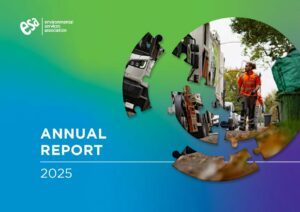ESA’s Patrick Brighty looks at Defra’s recently published plan for Simpler Recycling, and what it means for the UK’s waste and recycling sector.
Defra published details of the third pillar of its Resources and Waste Strategy (RWS) reforms last weekend, outlining its plan for Simpler Recycling, which aims to harmonise the collection of waste materials from homes and businesses.
After five years of uncertainty and delay, ESA welcomes the clarity of Simpler Recycling – which set out the range of materials that will have to be collected by all councils and businesses (with a few exemptions). We believe that the measures announced by Defra should increase the UK’s recycling performance by at least a few percentage points on its own – moving us closer to achieving the national target of a 65% municipal recycling rate by 2035.
Creating a nationally-consistent recycling service is a necessary counterpart to Defra’s Extended Producer Responsibility (EPR) plans. It is also an additional piece in the jigsaw of UK-waste reforms which includes similar measures in place in Wales and Scotland. If Defra now effectively align the simple, on-pack, binary recycling labelling to the core sets of materials to be collected from households across the UK, these reforms will make significant strides in helping to reduce consumer confusion.
However, meeting the requirements of these reforms, and delivering the requisite services alongside other changes needed by EPR, will require major upheaval to, and overhaul of, the UK’s recycling infrastructure. Concerningly, Defra has given the industry just over two years to do this for local authority collections – if that work was started now. What’s more, for business waste, barring a two-year exemption for micro firms, this requirement comes in a year earlier and may cause additional headaches for local authorities which co-collect business and household waste. Based on a survey of our members, ESA estimates that the infrastructure delivery programme is likely to take between 3-5 years to complete.
To exacerbate matters, although this week’s announcement brings much-needed clarity, certain questions remain outstanding and both councils and the private sector are unlikely to commit hundreds of millions of pounds of investment into new recycling infrastructure until they are answered – placing a further squeeze on timelines.
The ESA welcomed the continued flexibility and pragmatism for local authorities to collect the new range of materials in a way that best meet their local needs and delivers the best outcomes. However, this does raise questions about how, and to what extent, exemptions will be applied for both dry recyclables and organic waste collections. For example, comingling fibre with cartons and plastic films presents significant technical challenges for MRFs during the sorting process. Commingling of these materials would likely add costs and complexity and could impact on output quality. While the additional challenges presented by commingling could theoretically be reflected in modulated fees the harder-to-separate formats, EPR is a UK-wide waste policy and this may conflict with regulations in devolved authorities. For instance, Wales has imposed mandatory source segregation for households and will shortly bring in similar requirements for businesses. Under these requirements, fibre is collected separately from cartons and films, presenting fewer sorting and processing challenges.
Additionally, before major investment is committed, industry will be looking to understand the extent to which commingled collections deliver an “efficient and effective service” under the terms of EPR – and the implications of this for local authority payments; the effect of derogations on mandatory food waste collections for those with MBT and EfW contracts; enforcement plans for business compliance; Materials Facilities sampling and reporting requirements and a range of other details that need to be tidied up.
The ESA and other stakeholders representing the public and private sector will be participating in a limited consultation with Defra over Statutory Guidance in the coming weeks, in particular looking at Government’s proposal for a national exemption to allow commingled collections of dry recyclables without a TEEP assessment (for both LAs and businesses) and setting a minimum service standard of at least fortnightly residual waste collections – which seems to remove the ability for some councils to increase recycling rates in an effective and low-cost way.
Hopefully, this process will resolve at least some of the outstanding questions before the end of 2023 and allow the recycling and waste management sector to begin the task of delivering on the long-awaiting outcomes of these reforms.




